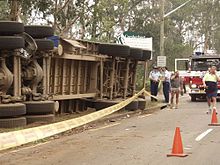Road traffic control
You must add a |reason= parameter to this Cleanup template – replace it with {{Cleanup|June 2006|reason=<Fill reason here>}}, or remove the Cleanup template.
Template:Globalize/USA
Traffic control involves directing vehicle traffic such as, for example, reducing speed and moving around a construction zone, accident, or other road disruption, thus ensuring the safety of emergency response teams, construction workers, and the general public. Traffic control includes using CCTV and other means of monitoring traffic to manage traffic flows. The term also includes providing information concerning traffic acidents in addition to planned road maintence.[1]

While construction traffic control in the U.S. used to be a widely unionized profession with a starting wage of 13-14 dollars per hour, it is now dominated by private business and wages have decreased to 7-9 dollars per hour. Because of the sheer tedium of the job and the lack of opportunity for advancement, most traffic control companies hire indiscriminately. There are no drug tests, background checks, or references required. Certification is necessary, but it takes 2-3 hours to obtain and consists of watching a training video and taking a basic test that reviews the material covered in the video.[citation needed]

A construction traffic control company operates in the same basic way as any other construction company. Companies submit a bid for a job, the lowest bid is accepted (except in the case of disadvantaged companies), and the labor is provided to the contractor or agency in charge. Typically speaking, flaggers work in groups of 5 to 10 under a TCS, or Traffic Control Supervisor. The TCS is responsible for placing the flaggers correctly, ensuring that they receive the proper breaks and supervision, and placing the cautionary signs (such as Road Work Ahead, One Lane Road Ahead, Uneven Lanes, etc.).
Traffic control is not generally considered to be a very desirable career. Often it serves as a summer job for people who, for one reason or another, are incapable of normal social interation, or have a criminal record which prevents them from a more fulfilling occupation.[verification needed]
See also
External links
- Automated Traffic Cone Placement-Retrieval Trailer
- U.S. Manual of traffic signs
- New Roads and Street Works Act 1991 U.K. law relating to traffic control
